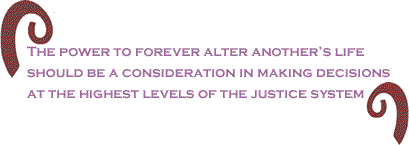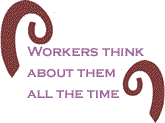
|
|||||||||||||||||||||||

|
|

Custom Search
|
|
 |
|
It’s
significant that President Obama cited “empathy” as one of the attributes
that he would look for in a U.S. Supreme Court nominee. Predictably, the chatterers on the nation’s air waves, who provide the delivery system for the propaganda of the ruling class, attacked him for seeking a nominee who presumably would cast votes on the high court on the basis of emotion, rather than the rule of law. What he may have meant was that his nominee to replace Justice David Souter should be someone who, in rendering decisions on the high court, could understand the effects of the court’s decisions on the daily lives of the people who are living under the laws as they are interpreted by just nine persons, often by a vote of 5-4. The “empathy” that Obama is looking for would be a significant factor in the outcome of future decisions on the court, especially if the justices can actually put themselves in the places of ordinary Americans, as they live their lives, always with an eye toward how their actions will be interpreted by those charged with upholding the law. Every day, arbitrary interpretations of law by law enforcement officials or even by the courts result in somebody’s long involvement with the criminal justice system. Once you are so marked, it’s difficult to escape from the legal entanglement, possibly for a lifetime. Whatever a person’s “judicial temperament” and whatever his or her political bent, the power to forever alter another’s life should be a consideration in making decisions at the highest levels of the justice system. That’s where “empathy” comes in - empathy, the capacity to recognize or understand another’s state of mind or emotion. Perhaps, empathy was not the best word for one of the qualities of a Supreme Court justice, but it is an important quality for anyone in a leadership or official position. The president might have said simply that he wanted someone who is not only highly qualified, but also one who understands the effects of legal decisions on whole segments of the population - minorities, women, workers. The state of mind or emotion of an individual or a group of Americans will be directly affected by any decision of the nominee and the other eight justices. That’s why the replacement for Justice Souter should be someone who is able to discern - through the haze of politics and the pressures of the political, legal, or philosophical groups with which a justice associates - the effects of decision-making on Americans’ daily lives. Although this is a far from perfect entity, this democratic-republic, if it was founded to be “of the people, by the people, and for the people,” it isn’t just the legislative and executive branches of government that need to understand, and respond to, the needs of the people. The laws that the justices interpret are enacted by representatives in Congress and signed by the president, in response to a need of the people - not to an individual, but to the general welfare of the people.
The status quo puts Corporate America in charge of the economy and, to a great extent, the political life of the nation. The people, though they have a right to cast a ballot, do not have much of an impact on the direction of the country - and that’s to their detriment. That may be why Obama seeks someone who has “empathy.” Jeffrey Toobin, writing in the May 25 issue of The New Yorker, noted that Justice John Roberts said at his confirmation hearing that judges are like umpires, that they play a limited role, but that “nobody ever went to a ballgame to see the umpire.” He would be such a judge, Nominee Roberts said. He would, he said, conduct himself with “modesty and humility.” “After four years on the court however,” Toobin continued, “Roberts’s record is not that of a humble moderate but, rather, that of a doctrinaire conservative. The kind of humility that Roberts favors reflects a view that the Court should almost always defer to the existing power relationships in society. In every major case since he became the nation’s seventeenth Chief Justice, Roberts has sided with the prosecution over the defendant, the state over the condemned, the executive branch over the legislative, and the corporate defendant over the individual plaintiff. Even more than (Antonin) Scalia, who has embodied judicial conservatism during a generation of service on the Supreme Court, Roberts has served the interests, and reflected the values, of the contemporary Republican Party.” It’s probably not necessary to point out that most Americans do not associate with national politicians, corporate executives, or Supreme Court justices. Their lives are very dissimilar, since the politicians, corporate executives, and judges and other members of the bar are the ones in control and in power. It’s likely to remain so for some time to come.
The
power brokers in the That’s when a little empathy goes a long way. It would be a good thing if more politicians and CEOs showed a little more of it. As it is, if Obama finds a Supreme Court nominee with a measure of empathy it’ll only be a good start. BlackCommentator.com Columnist, John Funiciello, is a labor organizer and former union organizer.
His union work started when he became a local president of The Newspaper
Guild in the early 1970s. He was a reporter for 14 years for newspapers
in |
|
Any BlackCommentator.com article may be re-printed so long as it is re-printed in its entirety and full credit given to the author and www.BlackCommentator.com. If the re-print is on the Internet we additionally request a link back to the original piece on our Website. Your comments are always welcome. eMail re-print notice
If you send us an eMail message we may publish all or part of it, unless you tell us it is not for publication. You may also request that we withhold your name. Thank you very much for your readership. |
|
| |
|
| May
28, 2009 Issue 326 |
|
| Executive Editor: Bill Fletcher, Jr. |
| Managing Editor: Nancy Littlefield |
| Publisher: Peter Gamble |
| Est. April 5, 2002 |
Printer Friendly Version
in resizeable plain
text format or pdf
format. |
| Frequently Asked Questions |
 |

|
 |
 |
 |
| |
| |






























 Decisions
made by nine justices should be a check on the other two branches
of government, rather than an auxiliary branch of the other two.
Every one of them, when they come to vote on a case, should be asking,
“What will be the effect of this decision on the people? Will this
decision be just for the people?”
Decisions
made by nine justices should be a check on the other two branches
of government, rather than an auxiliary branch of the other two.
Every one of them, when they come to vote on a case, should be asking,
“What will be the effect of this decision on the people? Will this
decision be just for the people?” This
is a bad time for the people, for wage-earning Americans, and every
day, more and more of them are thrown onto the unemployment rolls
and, because of the loss of so many millions of well-paying jobs
in recent months, many millions more Americans are going without
health care for themselves and their families than the 47 million
that are usually noted.
This
is a bad time for the people, for wage-earning Americans, and every
day, more and more of them are thrown onto the unemployment rolls
and, because of the loss of so many millions of well-paying jobs
in recent months, many millions more Americans are going without
health care for themselves and their families than the 47 million
that are usually noted.





